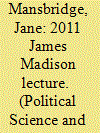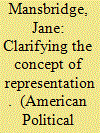| Srl | Item |
| 1 |
ID:
117539


|
|
|
|
|
| Publication |
2012.
|
| Summary/Abstract |
Trend plus inaction equals drift. When a trend has external causes and no one can act to intervene, that inaction leads to drift-the unimpeded trajectory of change. Drift in the United States produces the domination of American democracy by business interests. Drift in international decisions produces global warming. Specific institutional designs for government, such as the US separation of powers, can cause the inaction that facilitates drift. More fundamentally, ingrained patterns of thinking can cause inaction. Here I argue that the long and multifaceted resistance tradition in the West contributes to inaction by focusing on stopping, rather than using, coercion.
|
|
|
|
|
|
|
|
|
|
|
|
|
|
|
|
| 2 |
ID:
110548


|
|
|
|
|
| Publication |
2011.
|
| Summary/Abstract |
This response to Andrew Rehfeld's "Representation Rethought" (American Political Science Review 2009) takes up his criticisms of my "Rethinking Representation" (American Political Science Review 2003) to advance a more relational and systematic approach to representation. To this end, it suggests replacing the "trustee" concept of representation with a "selection model" based on the selection and replacement of "gyroscopic" representatives who are both relatively self-reliant in judgment and relatively nonresponsive to sanctions. It explores as well the interaction between representatives' (and constituents') perceptions of reality and their normative views of what the representative ought to represent. Building from the concept of surrogate representation and other features of legislative representation, it argues for investigating, both normatively and empirically, not only the characteristics of individual representatives emphasized by Rehfeld's analysis but also the representative-constituent relationship and the larger representative system, including both elected and nonelected representatives, inside and outside the legislature.
|
|
|
|
|
|
|
|
|
|
|
|
|
|
|
|
| 3 |
ID:
131519


|
|
|
|
|
| Publication |
2014.
|
| Summary/Abstract |
This address advances three ideas. First, political science as a discipline has a mandate to help human beings govern themselves. Second, within this mandate we should be focusing, more than we do now, on creating legitimate coercion. In a world of increasing interdependence we now face an almost infinite number of collective action problems created when something we need or want involves a "free-access good." We need coercion to solve these collective action problems. The best coercion is normatively legitimate coercion. Democratic theory, however, has focused more on preventing tyranny than on how to legitimate coercion. Finally, our discipline has neglected an important source of legitimate coercion: negotiation to agreement. Recognizing the central role of negotiation in politics would shed a different light on our relatively unexamined democratic commitments to transparency in process and contested elections. This analysis is overall both descriptive and aspirational, arguing that helping human beings to govern themselves has been in the DNA of our profession since its inception.
|
|
|
|
|
|
|
|
|
|
|
|
|
|
|
|
| 4 |
ID:
096209


|
|
|
|
|
| Publication |
2010.
|
| Summary/Abstract |
For the APSA panel commemorating Peter Bachrach, I was asked to speak to the "notions of inequality and inequity" in his work. For a while the topic stumped me. Then I realized why. Talking about inequality in Peter Bachrach's work, I decided, is much like talking about just distribution in Marx. It misses the point.
|
|
|
|
|
|
|
|
|
|
|
|
|
|
|
|